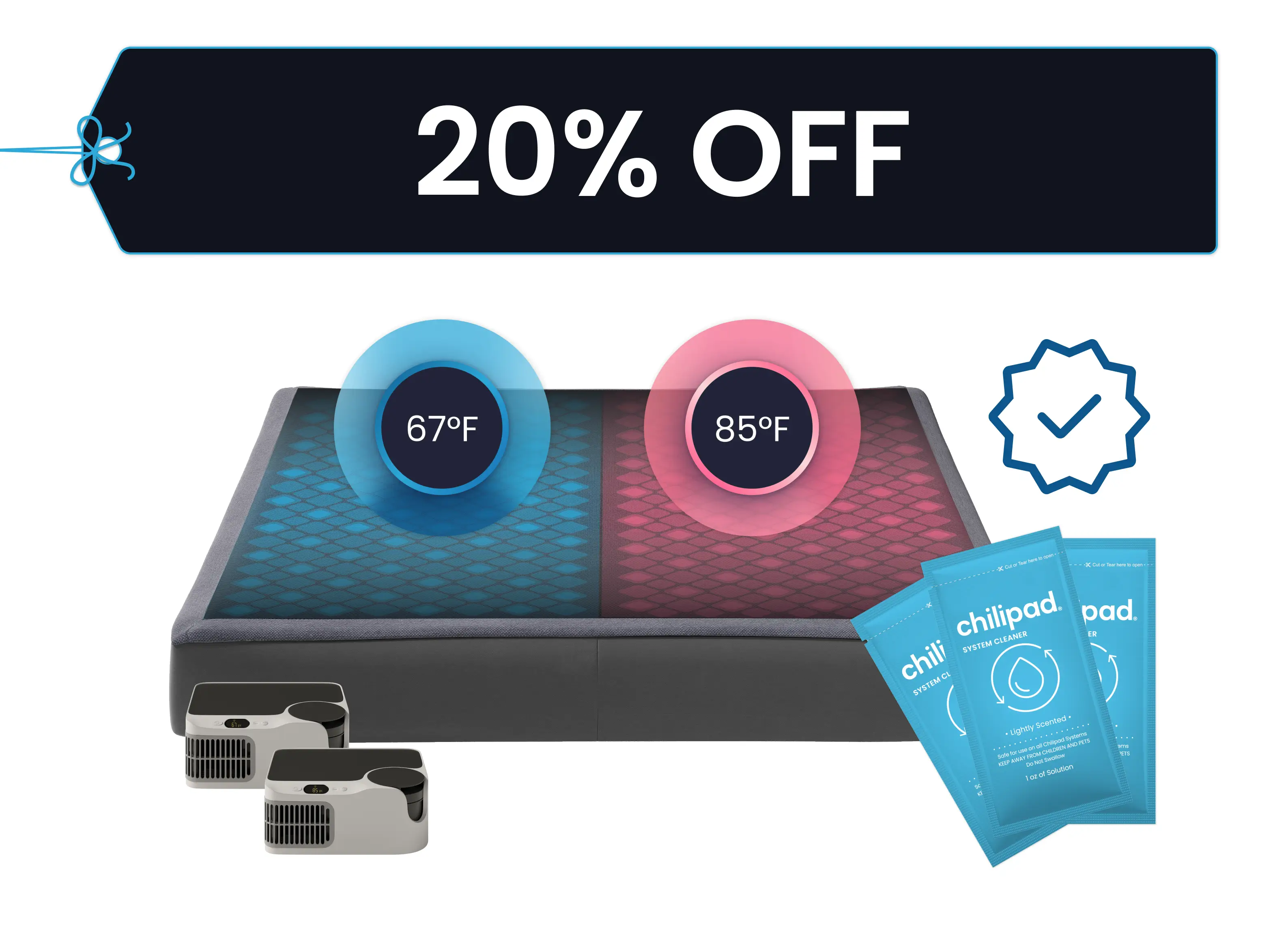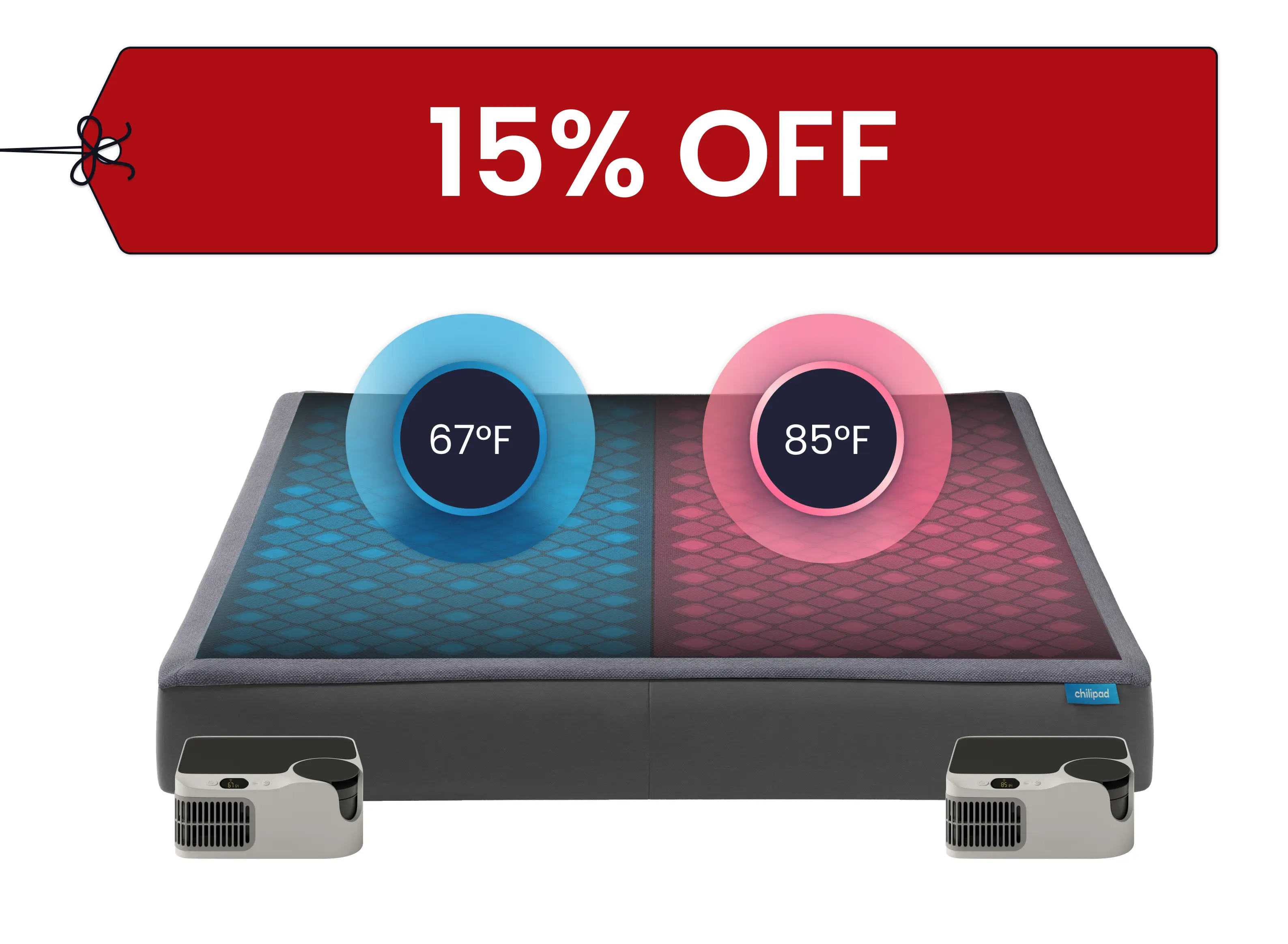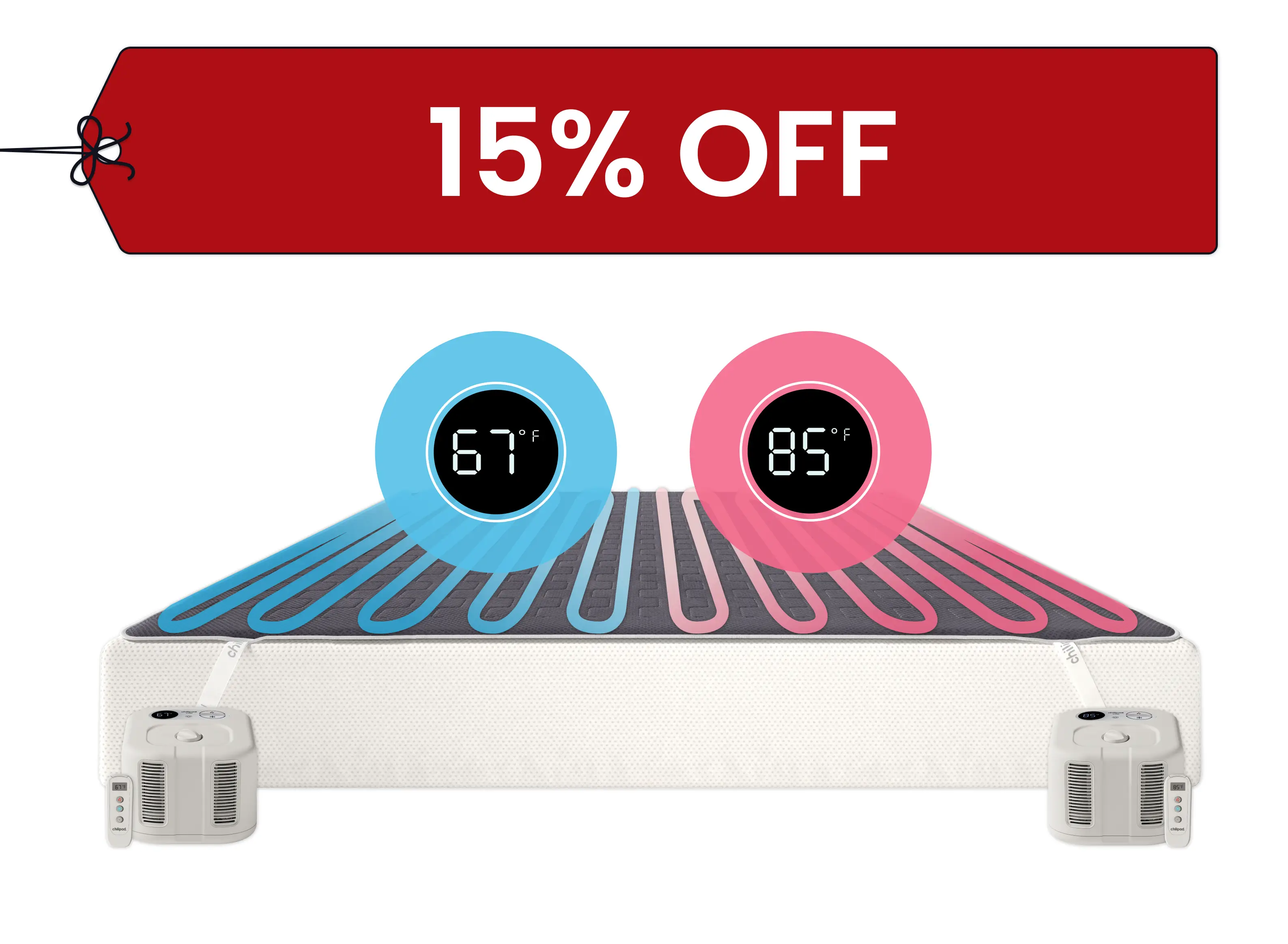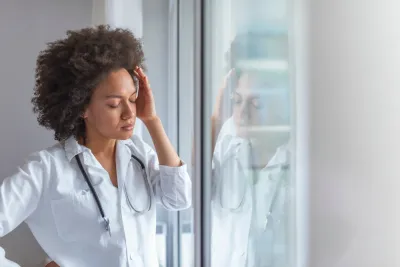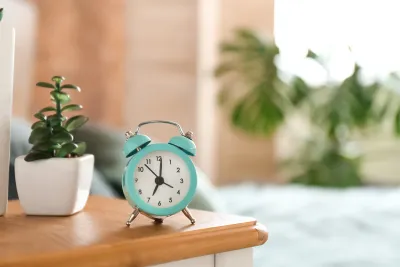Restless Legs Syndrome; Causes & Management Strategies
Ana Marie Schick: Resident Sleep Expert and Certified Health Coach • Sep 08, 2022
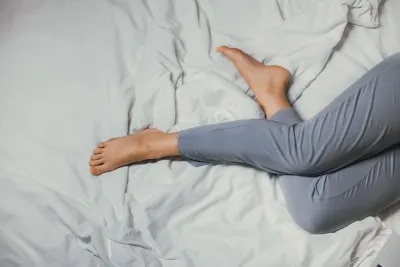
Key Takeaways
- Disruptive Condition: Restless Leg Syndrome (RLS) causes uncomfortable leg sensations and an overwhelming urge to move, particularly at night, which can severely disrupt sleep quality.
- Root Causes: RLS is linked to iron deficiency, dopamine imbalance, and certain chronic conditions like kidney disease or neuropathy.
- Lifestyle Factors: Symptoms can be worsened by caffeine, alcohol, lack of exercise, or poor sleep habits, making behavioral changes an important part of treatment.
- Cooling Support: Cooling sleep systems like the Chilipad can offer relief by helping to regulate body temperature and improve overall sleep comfort.
- Integrated Care: Effective RLS management often involves a combination of medical evaluation, lifestyle adjustments, and sleep environment optimization.
Restless Leg Syndrome makes it harder to fall asleep or stay asleep – and the hallmark symptom is a sensation deep in the legs. RLS sufferers describe very uncomfortable symptoms, using terms like creeping, itching, pulling, crawling, tugging, throbbing, burning, pins and needles, or gnawing.
Ouch!
In addition to disrupted and disjointed sleep patterns, RLS can also cause daytime sleepiness, cognitive issues, and lack of focus. Studies show that RLS may affect up to 10 percent of the population. [1]
Understanding Restless Legs Syndrome
Restless Legs Syndrome (RLS) is a neurological sleep disorder characterized by an uncontrollable urge to move the legs, often accompanied by uncomfortable sensations. These sensations can range from mild to severe and are frequently described as itching, tingling, burning, or cramping. Typically, RLS symptoms occur in the evening or at night, making it difficult for individuals to sleep.
The exact cause of RLS remains unknown, but research suggests it may be related to an imbalance of the brain chemical dopamine, genetics, iron deficiency, and other factors. Understanding these potential causes can help manage and treat the condition effectively.
Did You Know: Willis-Ekbom disease, another name for restless legs syndrome, is a neurological condition characterized by an uncontrollable urge to move the legs.
What Causes Restless Legs Syndrome?
The National Institutes of Health (NIH) has researched who is most likely to suffer from this frustrating sleep condition.
While restless legs syndrome can sometimes be caused by iron deficiency, end-stage renal disease, or the use of certain medications, [2] the NIH has reported that sleep deprivation may actually aggravate or trigger RLS symptoms.
Pregnancy and hormonal changes can also worsen RLS symptoms, with some individuals experiencing RLS for the first time during pregnancy, particularly in the later stages.
What this means is so interesting to me as a sleep scientist! Because what the NIH is saying [3] is that the root cause of RLS is sometimes not caused by anything “specific” – bad sleep may be the trigger!
Diagnosing Restless Legs Syndrome
Diagnosing RLS can be challenging, as there is no specific test for the condition. Healthcare providers usually diagnose RLS based on a patient’s medical history, symptoms, and physical examination. The International Restless Legs Syndrome Study Group has established four important criteria for diagnosing RLS:
- Uncomfortable sensations usually accompany an urge to move the legs.
- Evening or nighttime is when symptoms typically appear.
- Movement provides temporary relief from symptoms.
- Another underlying medical condition does not solely cause symptoms.
Blood tests may be ordered to rule out other conditions that may be causing RLS symptoms, such as iron deficiency or kidney failure. A sleep study might also be recommended to diagnose periodic limb movement disorder (PLMD), a common condition that often co-occurs with RLS. These diagnostic steps are crucial in ensuring accurate diagnosis and effective treatment.
Do You Have Restless Legs Syndrome?
Sleep experts at the Mayo Clinic Center for Sleep Medicine have created a list of possible RLS-related symptoms and other questions to ask yourself.
RLS-Related Symptoms & Common Questions
- Do You Get an Irresistible Urge to Move Your Legs?
- Do Your Symptoms Start While You’re Sitting or Lying Down?
- Are Your Symptoms Worse at Night?
- Does Movement Make You Feel Better?
- Do Kick, Shake or Otherwise Move Your Legs While Sleeping?
- Do You Often Have Trouble Falling or Staying Asleep?
- Are You Tired During the Day?
- Does Anyone Else in Your Family Have Restless Legs?
- How Much Caffeine Do You Have Daily?
- What Is Your Typical Exercise Program?
The first step is to recognize these potential RLS symptoms. If you frequently answer yes, you may want to discuss any of the symptoms with your doctor. It's best to avoide caffeine to help reduce urges.
Complications of Untreated Restless Legs Syndrome
Untreated RLS can lead to several complications, including:
- Sleep Disturbances: RLS can disrupt sleep patterns, leading to insomnia, daytime fatigue, and other sleep-related problems.
- Depression: The chronic discomfort and sleep disturbances associated with RLS can contribute to depression.
- Anxiety: Can cause significant anxiety, particularly in individuals who experience severe RLS symptoms.
- Reduced Quality of Life: RLS can impact daily activities, social relationships, and overall quality of life.
- Worsening Symptoms: Untreated RLS can worsen symptoms over time, making it more challenging to manage the condition.
Addressing RLS promptly can help prevent these complications and improve the overall quality of life for those affected.
How to Manage Restless Legs Syndrome
If your Restless Leg Syndrome is mild or moderate, simple self-care steps and lifestyle changes may help relieve symptoms of restless legs syndrome. If you want to treat RLS naturally, you should consider making small changes to your bedtime routine.
Here are four unique strategies you can use to minimize and manage your restless legs syndrome symptoms.
1. Increase Your Magnesium and Address Iron Deficiency to Improve Your Sleep
While restless legs syndrome treatment is still evolving, a Mayo Clinic study found that magnesium is an effective natural therapy. This is worth noting since other studies have shown that approximately 48% of Americans [4] do not meet their dietary requirements for magnesium.
How does magnesium improve sleep and RLS symptoms?
Magnesium helps regulate gamma-aminobutyric acid (GABA), an important amino acid that plays a key role in overall sleep health. One of GABA's primary functions is to help your brain power down for the night, helping you relax, de-stress, and, ultimately, fall asleep.
Magnesium helps your body maintain healthy levels of GABA, allowing for more restorative sleep. This calming ritual also naturally boosts your circadian rhythm.

Try adding green leafy vegetables (spinach, collard greens), legumes, nuts, seeds, and whole grains for simple ways to increase your magnesium intake. Magnesium is also added to some breakfast cereals and other fortified foods.
Tip: Find easy and delicious ways to get more magnesium with the Top 10 Magnesium Rich Recipes.
Another low-fat and delicious breakfast idea is oatmeal, bananas, blackberries, and skim milk—all excellent sources of magnesium!
You may also want to ask your healthcare provider if magnesium supplementation is safe for treating restless legs syndrome.
For example, some find temporary relief by taking Epsom salt warm baths before bed, rubbing magnesium oil into the lower legs before bedtime, or taking magnesium citrate tablets.
2. Sleep Colder to Treat Restless Legs Syndrome Naturally
Sleeping at cooler temperatures also plays a big role in sleep quality, and temperature management can be a key component in managing the “feeling” of the nerves when suffering from RLS. After all, it's long been suggested that patients use a heating pad or ice packs on their legs to treat RLS naturally.
How to Sleep Colder at Night?
Here’s how to put cold sleep hacks into practice:
- If you’re using one of our products, plan for a 2-3°F temperature drop, for a deep sleep window of about 4 hours, toward the beginning of your total sleep time. Sleepme’s sleep solutions (Chilipad Dock Pro and Cube) include hydro-powered mattress pads, operating between 55-115°F.
- If you are not using our products, set the room temperature at bedtime as cold as possible without waking you. The colder you can sleep, the more efficiently the deep sleep switch can turn on and stay on for longer. If you wake up too cold in the middle of the night, increase the temperature by 1-2°F and try again.

3. Try CBD Oil and Cannabinoid Supplements
Did you know that CBD may also help restless legs syndrome? According to a study, 84% of participants found CBD helped to calm the more immediate symptoms of RLS. [5]
CBD products have been shown to balance the body, allowing it to sleep better, respond better, stress less, and recover better.
It's a good idea to talk with your doctor before trying any CBD product, especially if you take certain medications. But for most people, CBD products are great when looking for sustainable, more organic alternatives.
4. Find Sleep Support: Try a Virtual Support Meeting
Last but not least, we are humans and we thrive on interaction. Connecting with people who truly understand can be so therapeutic!

You will be thrilled to discover that the Restless Legs Syndrome Foundation, the leading organization for science-based education and patient services for those dealing with RLS, offers a fantastic free option for you.
Their virtual support meetings on Zoom are open to anyone interested in learning more about RLS and who wants a safe place to share their personal RLS sleep concerns and victories. To register, go to www.rls.org/VSG.
The organization also features some pretty great “first-person” stories, including a very honest and authentic article by a woman who shared that “to manage my restless legs syndrome, especially concurrently with menopause, I stay as cool as possible."
You might find yourself relating to stories of those suffering from night sweats, especially if you're also dealing with other challenges like menopause alongside RLS. As I've mentioned before, if hot flashes at night are keeping you awake, the key really is learning to cool it down!
Strategies for Better RLS Management
Improving care for people with RLS requires a comprehensive approach that addresses the condition's physical, emotional, and social aspects. Here are some ways to improve care:
- Education: Educating patients and healthcare providers about RLS can help improve diagnosis and treatment options.
- Lifestyle Changes: Encouraging lifestyle changes, such as regular exercise, stress management, and relaxation techniques, can help alleviate symptoms.
- Certain Medications: Developing new and improving new medications can help manage RLS symptoms more effectively.
- Alternative Therapies: Patients can find additional relief by exploring alternative therapies, such as stretching, massage, or heat therapy, aim to calm the nerves and reduce unwanted muscle movements that contribute to discomfort at night.
- Support Groups: Establishing support groups can provide emotional support and connect patients with others who understand their experiences.
Improving care for people with RLS can enhance their quality of life, reduce symptoms, and promote better sleep and overall well-being.
Wrapping Up
People of any age, including children, might suffer from RLS. It typically occurs in the evening, making it difficult to fall asleep.
In this post, we explored some lifestyle changes -- including the importance of sleeping colder -- to relieve frustrating sleepless nights due to restless legs syndrome.
Sleepme products (that act as a cooling mattress pad) are the best tools on the market to cool down your sleep environment and come with free U.S. shipping and a 30-night trial.
Whether you try out the new Chilipad Dock Pro, the best heating and cooling mattress pad, or the Cube, our original mattress cooling pad, there's an option for everyone.
In addition to finding ways to sleep cooler and improve your sleep environment, don’t forget to take time for yourself. Meditation, breathwork, and stress breaks can seem like they are cutting into your time. But I challenge that thought.
When you take the time you need to be peaceful, to sleep, and to find balance, you will get time back in the form of productivity.
Frequently Asked Questions
What Are the Common Symptoms of Restless Legs Syndrome?
The common symptom of RLS is an uncomfortable sensation deep in the legs, often described as creeping, itching, pulling, crawling, throbbing, or burning. These symptoms typically occur in the evening or at night and are relieved by movement.
What Causes Restless Legs Syndrome?
We don't know the exact root cause of RLS, but we've found some connections. It often involves a problem with dopamine, the chemical in your brain that helps with movement. It can also be passed down through families. Low iron levels can be a trigger, as can some medications and kidney disease. And, unfortunately, sleep deprivation and pregnancy can make symptoms worse.
How Can Restless Legs Syndrome Be Managed Naturally?
Yes, they include:
- Prioritize Sleep Hygiene
- Temperature Regulation with the Chilipad Dock Pro
- Lifestyle Adjustments
- Dietary Considerations
- Gentle Stretching
- Message and Relaxation
References
[1] Mary Anne Dunkin. “Restless Legs Syndrome.” WebMD, WebMD, 7 Feb. 2011, View Resource
[2] “FAQ - Restless Legs Syndrome Foundation.” View Resource. Accessed 29 Apr. 2022.
[3] “Restless Legs Syndrome Fact Sheet | National Institute of Neurological Disorders and Stroke.” Nih.gov, 2019, View Resource
[4] National Institutes of Health. “Office of Dietary Supplements - Magnesium.” Nih.gov, 2016.
[5] Ghorayeb I. (2020). More evidence of cannabis efficacy in restless legs syndrome. Sleep & breathing = Schlaf & Atmung, 24(1), 277–279. View Study

